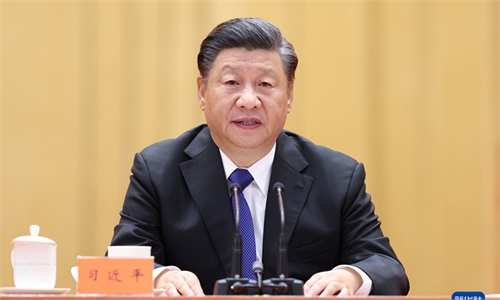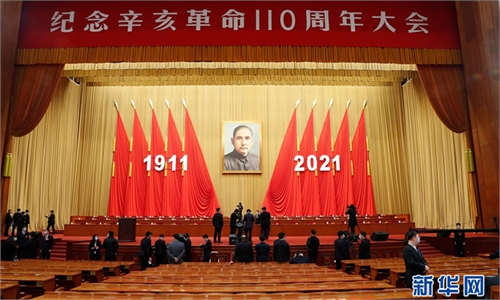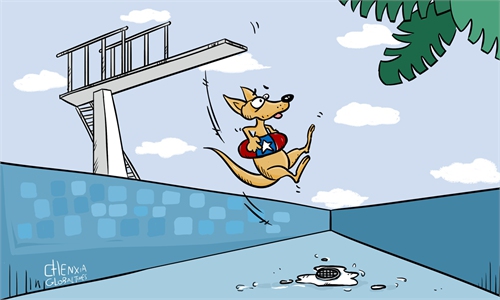Tsai’s Double Ten speech a political farce
Secessionist DPP cannot abduct will of 23 million Taiwan compatriots
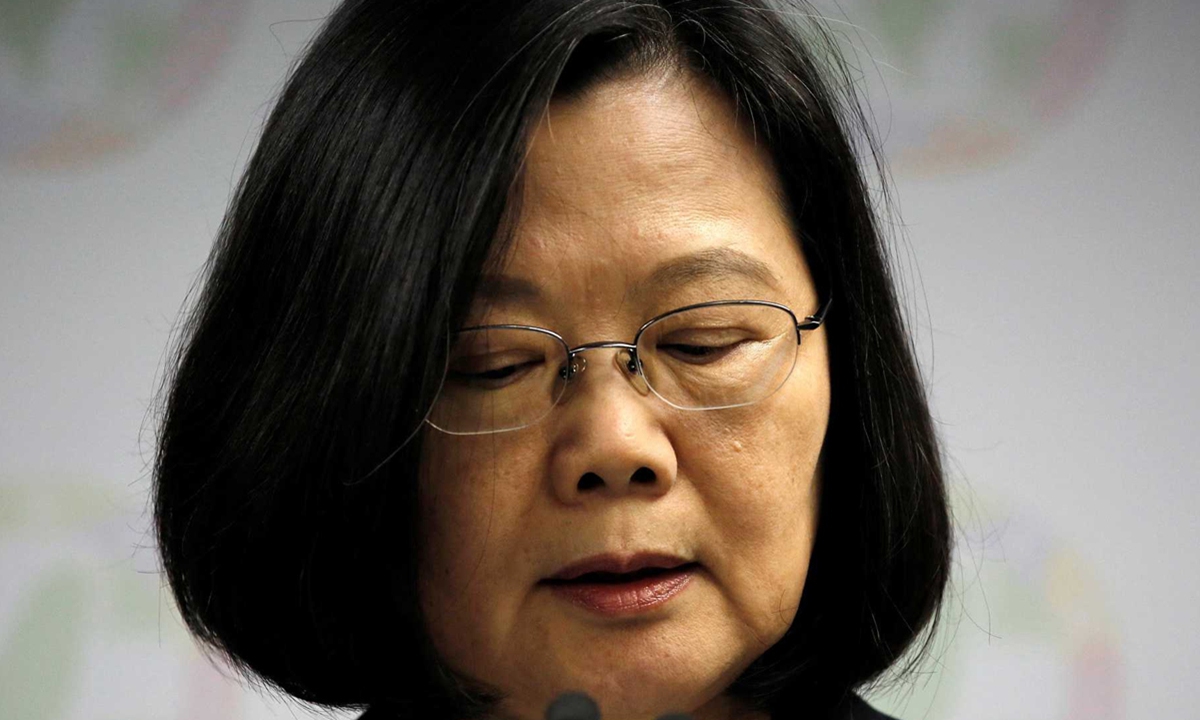
Tsai Ing-wen Photo:VCG
One day after Chinese President Xi Jinping warned Taiwan secessionists and stressed that the Taiwan question will be resolved along with national rejuvenation in his speech on Saturday marking the 110th anniversary of the 1911 Revolution, Taiwan regional leader Tsai Ing-wen continued to deceive the international community and Taiwanese people by hiding the truth that secessionist authorities on the island are the root cause of cross-Straits tensions.
Held under the theme "Forming a democratic alliance and collecting friends from all over the world," this year's Double Ten Day, a public holiday in the island of Taiwan originally meant to commemorate the Chinese Revolution of October 10, 1911, has been seen by observers across the Straits as yet another farce staged by the ruling secessionist Democratic Progressive Party (DPP) and its leader Tsai that serves to promote their desinization agenda and daydream of a "two-state theory."
In an obvious betrayal of 1911 Revolution leader Sun Yat-sen's idea and unfulfilled mission of Chinese national rejuvenation and reunification, the DPP leaders including Tsai herself and Taiwan's "Legislative Yuan" leader Yu Shyi-kun did not mention Sun's name or spirit even once on Thursday morning, and Tsai referred to the region with the awkward term "Republic of China Taiwan."
Sun is the founding father of the Kuomintang (KMT) and the Republic of China (1912-1949), and after Sun's death, his successor Chiang Kai-shek betrayed the revolution and Sun's policy of working with the Communist Party of China (CPC), and launched massacres and a civil war against the CPC. Eventually, the KMT was defeated by the CPC and fled to the island of Taiwan in 1949.
On Saturday, at a high-profile gathering marking the 110th anniversary of the 1911 Revolution held at the Great Hall of the People in Beijing, Chinese President Xi said the Taiwan question will be resolved along with national rejuvenation and warned that secessionists are a serious threat to that mission, and that those who betray the country will face the trial of history.
Xi emphasized that the Taiwan question is a Chinese internal matter that no external forces can interfere with. Nobody should underestimate the Chinese people's determination, will and capability in safeguarding sovereignty and territorial integrity, he said.
In Sunday's speech, Tsai didn't state the fact that this year's Double Ten Day mark the 110th anniversary of the 1911 Revolution during her speech on Sunday morning, but only stressed how the "country" had advanced from poverty to prosperity in the past "72 years" (since the Republic of China regime fled to the island of Taiwan in 1949), and it was the faith in "ensuring the sovereignty and guarding the homeland" that was the key to supporting the island of Taiwan's survival and fostering of democracy.
Chang Ya-chung, the president of the Sun Yat-sen School in Taiwan and a member of the KMT, Taiwan's major opposition party, viewed Sunday's farce by Tsai and the DPP as an extension of their long time agenda of cutting off the history of Taiwan from the Republic of China's, in denial of the "one-China principle," in order to promote the idea of "two nations."
Tsai also stated Sunday that it is imperative to conduct so-called equal conversation to resolve cross-Straits differences, which is an apparent change of her wording from last year when she called for the Chinese mainland to have "peaceful dialogue" with the island in 2020.
Observers said such changes indicate nothing more than another step further into Tsai and the DPP's secessionist path, which is a dead end. As Tsai refused to acknowledge the 1992 Consensus, jeopardizing the political ground on which the two sides can conduct any talks, the Chinese mainland authority would never accept such proposal of "equal conversation", Chang told the Global Times on Sunday.
Tsai said she hoped for eased ties between the two sides across the Straits, and claimed the island would not make any rash advance, while emphasizing that it would not surrender to pressure either.
She vowed to continue to hone the island's defense capability, display self-defense determination, and make sure no one can force them onto a path laid out by the Chinese mainland.
The DPP leader also outlined plans to make an amendment to the "constitution" that would serve to protect so-called freedom and democracy on the island.
What Tsai and the DPP are trying to achieve here is to destroy the essence of the "constitution", Chang said, noting that Tsai would only follow the steps of previous secessionist leaders such as Lee Teng-hui and Chen Shui-bian to accumulate small changes toward an eventual qualitative change.
Although Tsai has not disclosed details of these "constitutional reforms" on the island, the act itself would open a Pandora's box and lead to steps toward making Taiwan secessionism legitimate, allowing the ruling party to make adjustments at will, Zhang Wensheng, a deputy dean of the Taiwan Research Institute at Xiamen University, told the Global Times on Sunday. "She is rashly advancing secessionism despite claiming a willingness to maintain the status quo with unwavering kindness."
Zhang criticized Tsai's Sunday speech as being filled with resentment against the Chinese mainland and for suggesting the latter was an enemy state, which fully shows the DPP leader's secessionist nature and its agenda of promoting the "two-state theory."
Picturing Taiwan as the front of the Western democratic and free world against the expansion of authoritarian in order to win the support and sympathy of the international community is a complete provocation, Zhang said.
If the DPP authority continues such provocative acts, the mainland will have no choice but take it to the battlefield, he warned.
China's internal affair
Tsai's speech advocates "Taiwan secessionism" and incite confrontation between the two sides of Taiwan Straits, distorting facts and holding the Taiwan public hostage in the name of "consensus and solidarity", while colluding with foreign forces to provoke the mainland and seek secessionism, Ma Xiaoguang, a spokesperson for the Taiwan Affairs Office of the State Council, said in a statement on Sunday night.
"Our crackdown against Taiwan secessionists is targeting the DPP and secessionist forces, rather than Taiwan compatriots. The DPP cannot fool the Taiwan public or the international community by creating bad blood and obscuring the facts," the spokesperson said.
Ma slammed the DPP authority, saying that ever since taking power, it has shown no political ability other than creating conflicts between people and dividing Taiwan society. Trying to package secessionist populism as so-called democracy and freedom, and claiming Taiwan is becoming better and better, the DPP has greatly underestimated the intelligence of the Taiwan public.
The future of Taiwan should be decided by all Chinese people including the 23 million Taiwan compatriots. The DPP cannot abduct the will of 23 million Taiwan people, let alone stop the major trend of historical development, Ma concluded.
The self-deceiving Tsai and other DPP leaders repeatedly hailed the so-called support from the "great democratic allies" and lauded the "helping hands" from countries including the US, Japan, Australia, Czech and Lithuania.
Tsai's failure to handle cross-Straits relations properly is the root cause of the current tense situation and labeling the island as the frontline of the so-called democratic world is self-deceiving and a desperate attempt to fool the 23 million compatriots living on the island so she can extend her political life and benefit the DPP, Chang noted.
How many of the 23 million people living on the island would blindly follow Tsai to fight a war with the Chinese mainland, on what grounds, and how many of its so-called allies could Taiwan really rely on if a cross-Straits war breaks out, said Yang Lixian, a research fellow at the Beijing-based Research Center of cross-Straits Relations.
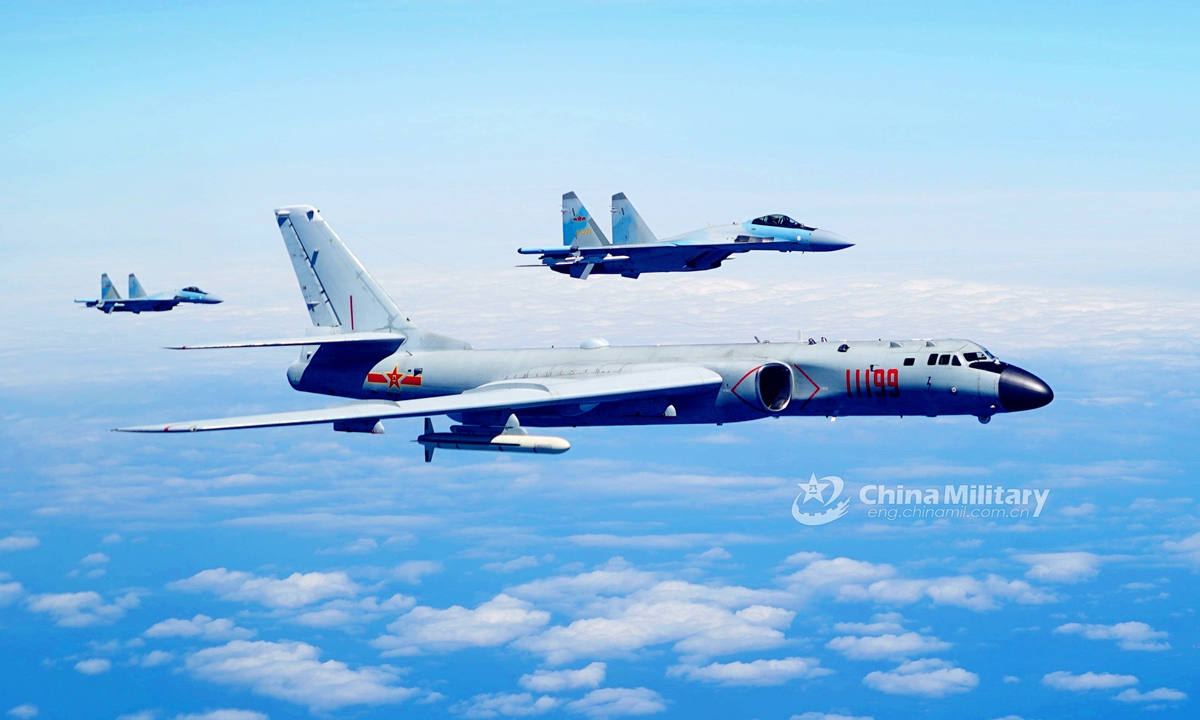
Two PLA Su-35 fighter jets and a H-6K bomber fly in formation. The PLA air force conducted patrol training arround China's island of Taiwan.Photo:China Military
Strength matters
As part of the Sunday event, the armed forces on the island of Taiwan showcased some of its weapons in a parade, including Apache helicopters, F-16V fighter jets and Hsiung Feng III missiles.
Also on Sunday, aircraft of the Chinese People's Liberation Army (PLA) approached the island of Taiwan again, media outlets on the island reported, citing open radio broadcasts and flight path records.
Three PLA aircraft - two J-16 fighter jets and a Y-8 anti-submarine aircraft - entered Taiwan's self-proclaimed southwest air defense identification zone on Sunday, the island's defense authorities said later in the day.
The defense authorities on the island have reported 150 PLA aircraft flying into the island's self-proclaimed air defense identification zone between October 1 and Thursday, the National Day holiday in the Chinese mainland, breaking the record in terms of scale three times in the process.
Also on Sunday, the mainland's China Central Television published a report introducing a recent PLA amphibious landing exercise. The drill, organized by the PLA 73rd Group Army in a sea area south of East China's Fujian Province, which is close to the Taiwan Straits, featured troops conducting beach assaults with charge boats, drones and laser engagement systems, with the aim of comprehensively honing the forces' skills in carrying out such tasks.
The PLA activities again demonstrated the overwhelming advantages the PLA has over the armed forces on the island of Taiwan, which is now also being acknowledged by many on the island, a Chinese mainland military expert who requested anonymity told the Global Times on Sunday.
The island's display of its warplanes, armored vehicles and missiles in the Sunday event, on the other hand, exposed the fact that its best weapons are no match for the Chinese mainland's, when people compare them to what the PLA has displayed in events such as the Airshow China 2021 and the National Day military parade in 2019, the expert said.
Resisting reunification by force will only bring doom more quickly to Taiwan secessionists, the expert said.


